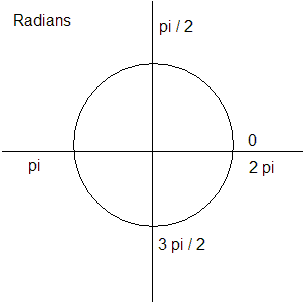
Trigonometric Functions
Each of the trigonometric function below returns a numeric value and
can be used where ever a numeric value is appropriate. Note that arguments
representing angles (i.e., arguments to sin, cos, cot, and
tan) must be in radians. The functions
returning angles (i.e., arcsin, arccos, arccot, and
arctan) return angles in radians. The
examples below show some ways these functions can be used. Of course,
actual Raptor programs may use different functions in different ways to
achieve the programmer's desired functionality.
In Assignments:
x_sin <- sin(x)
x_sin <- sqrt(1.0 - cos(x)^2)
In Select and Loop Exit Comparisons:
arcsin(x) > 0.0
arccos(x) <= pi / 2.0
sin(x) > 0.0 and cos(x) <
0.0
Other places where functions can be used include output boxes (when a value is output) and as arguments to calls.
The unit circle figure below shows the radian measures for some angles.

Below are descriptions of the trigonometric functions.
variable <- sin(expression_in_radians)
sin returns the sine of the provided argument representing an angle in radians. For example, sin(pi/6) is 0.5, and sin(pi) is 0.
variable <- cos(expression_in_radians)
cos returns
the cosine of the provided argument representing an angle in radians.
For example, cos(pi/3) is 0.5, and cos(pi) is
-1.
variable <- tan(expression_in_radians)
tan returns the tangent (sine
/ cosine) of the provided argument representing an angle in radians. For
example, tan(pi/4) is 1, and tan(pi) is 0. Note
that a run-time error will occur if the cosine of the given argument is
0.
variable <- cot(expression_in_radians)
cot returns
the cotangent (cosine / sine) of the provided argument representing an
angle in radians. For example, cot(pi/4)
is 1, and cot(pi)
is 0. Note that a run-time error will occur if the sine of the given argument
is 0.
variable <- arcsin(expression)
arcsin returns (in radians)
the angle between -pi/2 and pi/2 whose sine is the argument. For example,
arcsin(0.5) is pi/6, and arcsin(0) is 0.
variable <- arccos(expression)
arccos returns (in radians)
the angle between 0 and pi whose cosine is the argument. For example,
arccos(0.5) is pi/3, and arccos(-1) is pi.
variable <- arccot(x,y)
arccot returns (in radians)
the angle between -pi and pi whose cotangent is x/y. The
angle will be in the correct quadrant based on the signs of x and y. For
example, arccot(sqrt(2)/2,sqrt(2)/2) is pi/4, arccot(-sqrt(2)/2,sqrt(2)/2)
is 3/4 *pi, arccot(sqrt(2)/2,-sqrt(2)/2) is -pi/4, and arccot(-sqrt(2)/2,-sqrt(2)/2)
is -3/4 *pi.
variable <- arctan(y,x)
arctan returns (in radians)
the angle between -pi and pi whose tangent is y/x. The angle
will be in the correct quadrant based on the signs of y and x. For example,
arctan(sqrt(2)/2,sqrt(2)/2) is pi/4, arctan(-sqrt(2)/2,sqrt(2)/2)
is -pi/4, arctan(sqrt(2)/2,-sqrt(2)/2) is 3/4*pi, and arctan(-sqrt(2)/2,-sqrt(2)/2)
is -3/4 *pi.